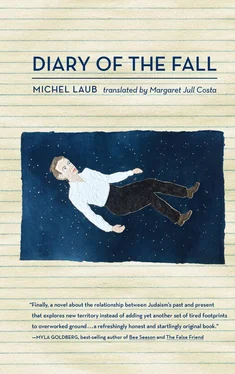15.
I never took classes in boxing, capoeira or judo. I never did karate or jiu-jitsu. I spent years fighting in the most varied of places and for the most varied of reasons, and I never used any technique other than force mixed with a kind of courage that is almost a desire to get as badly beaten up as your opponent: a sprained wrist after delivering a punch, a cut to your forehead after headbutting someone, the day you have to be taken to hospital and spend the next week telling everyone you were attacked by three older assailants armed with nunchuks and butcher’s knives, and until I received my third wife’s ultimatum I would have been capable of offering the most varied of explanations as to why I’d always behaved like that, as if it were something involuntary, a genetic predisposition or a trauma resulting from everything I’d experienced from fourteen onward, because that kind of reasoning allows you to justify anything, even the worst, the most grotesque of actions, the kind you only confess to at the very end of your argument.
16.
I could have continued taking that line of defense, and returned to the mantra that begins on the day when I stopped talking to João, as if that day were a rite of passage, the discovery that everyone at some point needs to make, my grandfather standing before the gates of Auschwitz, my father standing before my grandfather sprawled across his desk, and the fact that at the time I thought of those three things as equivalents, Auschwitz for my grandfather and my grandfather’s death for my father and the last note I received from João, Auschwitz and a suicide and a crumpled piece of paper from a notebook, Auschwitz and a suicide and a penciled drawing, just the fact that I once thought of those three things as equivalents could also be seen as further proof of the nonviability of human experience at all times and in all places, and I could have spent the rest of my life using that statement as a justification for what I did to other people and to myself in the years that followed, the breakup of my first marriage after which I still couldn’t behave in any other way, the breakup of my second marriage after which I still couldn’t behave in any other way, my third wife with whom I tested the limits still further, and when I left that café it was like another test, me stumbling home and saying hi to the caretaker and entering the apartment and falling onto the bed with my shoes still on, and then my third wife waking up and confronting me and me looking at her and for the last time giving her my usual response.
17.
My third wife wakes up and asks where I was before I fell onto the bed with my shoes still on. She asks me to explain why on the previous two mornings I had also fallen onto the bed with my shoes still on. She’s tired of asking the same questions and hearing the same answers and us spending the whole night awake because she won’t resign herself to seeing me in that state, nor to hearing my usual answer whenever she brings the subject up, the fact that I don’t want to see what she sees, and don’t want to admit what is as clear as day to her, and it’s then that the tone of this telling-off becomes accusatory, and the volume rises and the anger grows until I can’t stand the hell of spending whole nights like this and I aim a kick at the television, and my third wife leaps up and flings herself on top of me as if terrified that something really bad is about to happen, and then I grab her by the shoulders and shake her hard and, just as I’ve been doing since I was fourteen years old, I set to: I throw her down on the bed (João, Auschwitz, my grandfather and my father, the nonviability of human experience at all times and in all places) and clench my fists (João, Auschwitz, my grandfather and my father, the nonviability of human experience at all times and in all places) and look her in the face (João, Auschwitz, my grandfather and my father, the nonviability of human experience at all times and in all places) and then I do what I have to do.
18.
After ten years I got used to it. No one talked to me about it anymore. No one took any notice when there was a report on TV about something similar. Over the years I had managed to concentrate on what interested me, the shop, my mother, and one of the things I learned over the years was never to show any weakness .
19.
My mother never knew that I would sometimes lock myself in my bedroom to cry. No one in the shop knew that I would sometimes, in the middle of the morning, lock myself in the toilet and stay there for ten minutes or half an hour crying .
20.
I cried at university. I cried in the car. In the street. I’ve cried at the cinema. In a restaurant. In a football stadium. At the swimming pool while I was swimming and afterward in the changing room while I got dressed .
21.
After the fight I had with my father when I was thirteen, I was always drunk whenever I attacked someone physically. My third wife was the first to find this out and that was why the main condition she laid down when she issued her ultimatum was that I should stop drinking. This was the day after I kicked the television, during a relatively calm conversation we had, in which she told me that she wouldn’t stay with me if I continued to behave like that, and that she would leave the apartment at once if she saw me in that state just one more time, and I would normally have let things end like that because that’s what I’d always done until I was forty, and I was in no mood to deal with the situation, because it’s painful to look at your wife, her nose, her right eye and her left eye, her mouth and teeth and her whole face which you could have struck and disfigured if, at the last moment, you hadn’t diverted the blow and punched the mattress instead, missing her by about a centimeter.
22.
Punching the mattress meant that I didn’t have to take her to the hospital or find myself being taken to the police station, but it didn’t stop me falling limply onto the bed unable to say a word, filled by a torpor that was neither sadness nor guilt: there I was beside my third wife, thinking about what I’d been about to do to her, what I’d been doing to others and myself ever since I was fourteen years old, and I don’t know what would have happened if the fight when I kicked the television hadn’t occurred just before I found out that my father had Alzheimer’s and I received my third wife’s ultimatum, her calm voice saying that I wasn’t fit to be the father of a child.
23.
It’s impossible not to connect those two things: my trip to Porto Alegre and my third wife’s calm voice pointing out to me the glaringly obvious. I talked to my father in his study, but my mother was always there too and her presence helped keep our minds off the subject, because my father was determined not to let her see how shaken he was, as if she were the one who needed to be consoled and treated with the slightly patronizing air of adults trying to explain something difficult to a child, and all it took was for me to mention the word Alzheimer’s for my father to take on that role and act as if the matter were of no immediate concern, and initially we discussed only whether he would need to have more tests done or get a second opinion, and that was when I realized that those steps would be taken one at a time.
24.
At first, my father treated the matter as if it were all merely part of the domestic routine, and I even had the impression that he insisted on my mother behaving as if nothing had happened, and made an effort in her presence to maintain his usual habits, and whenever I phoned my mother, she would say he was just the same, still grumbling, still making that annoying chewing noise and listening to the same radio program every morning. It was as if she and I had convinced ourselves that my father was still the same person, as if each phone call were a kind of renewal of our license to believe that. It became commonplace for him to repeat a question he had asked two minutes before, to overpay the cleaner or the caretaker, to change mood in the middle of a conversation, but the winter’s afternoon when he would surprise my mother still seemed a long way off, an unfamiliar gesture, a word she had never heard him use in over forty years of marriage, a novelty that announced a still faster rate of change, my father losing a little of what we both thought of as unique to him, then one morning he wakes up and can’t remember the name of a city, and the next whether a particular animal flies or swims or crawls, and the day after, the color of his own car and how you use the accelerator and the brake, and suddenly he doesn’t know how many years he’s been married to my mother, and on that winter’s afternoon, while she’s drinking tea and listening distractedly to the wall clock striking five, she realizes that he has no idea who he is or what he’s doing there.
Читать дальше












